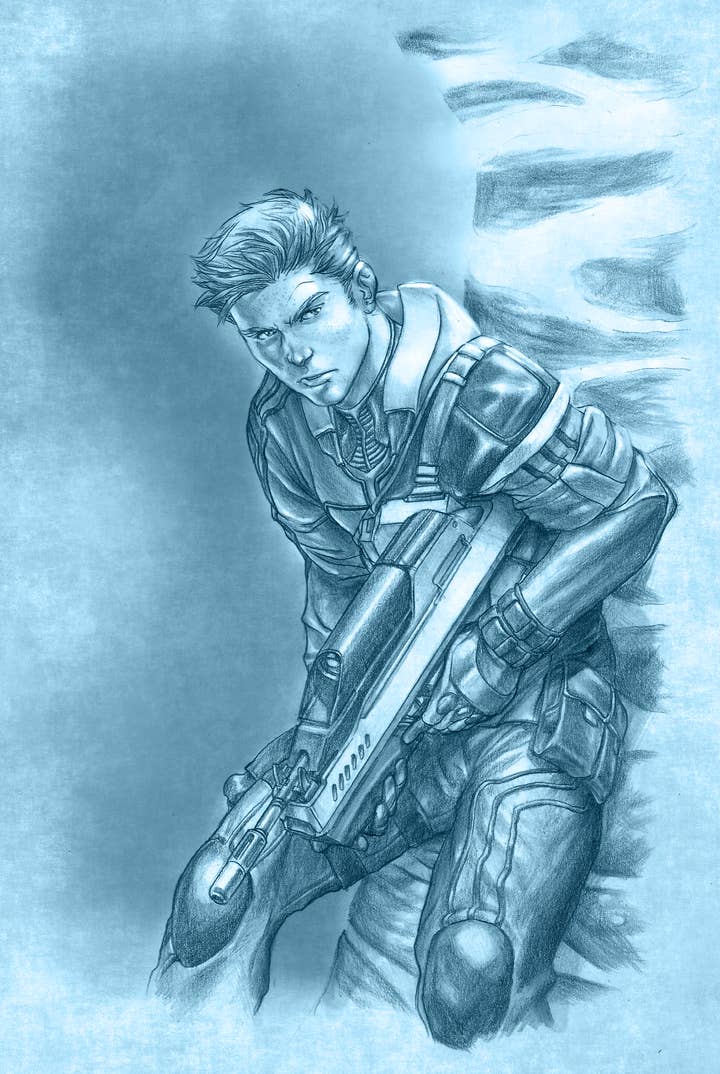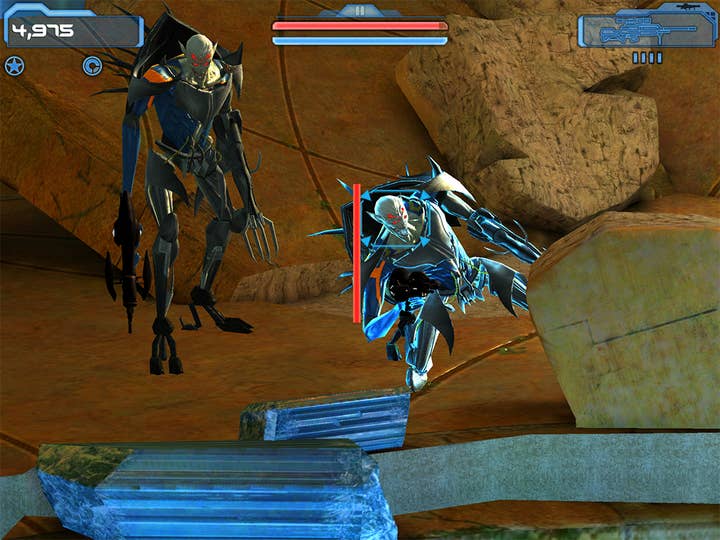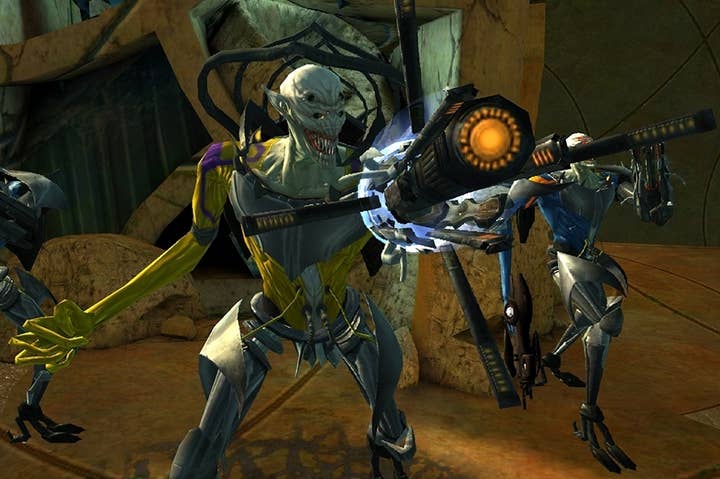Industrial Toys aims to "reimagine the shooter for touch"
The team led by Bungie co-founder Alex Seropian has unveiled Morning Star for iOS; we speak with president Tim Harris
On November 15, 2001, Xbox and Halo: Combat Evolved took the console world by storm. Hardcore shooter fans insisted all along that the only proper way to play a shooter is with a mouse and keyboard. Halo changed all that, however, and now console shooters rake in billions of dollars each year. The next frontier for shooters could very well be on touch devices (smartphones and tablets) and, interestingly enough, Bungie co-founder Alex Seropian once again finds himself in the middle. His new mobile company Industrial Toys wants to reimagine the way we play shooters with touch devices.
This morning, Industrial Toys officially unveiled the first project in a new universe called Morning Star. The game is set for release on iOS next spring, and bills itself as "a complete reimagining of the science fiction shooter, combining pillars of the genre such as deep immersion and intense action with controls, community and competitive multiplayer specifically designed for mobile platforms."
Morning Star is the first in a multi-title deal Industrial Toys signed with Epic to license its Unreal Engine for mobile, and as such it leverages all the eye-popping effects we've come to expect such as full-screen distortion, high-definition shadows and HDR Lighting.
Prior to the game's announcement, GamesIndustry International got on the phone with Industrial Toys co-founder and president Tim Harris to talk about the studio's ambitions and what will set Morning Star apart in a crowded mobile world.

"We've been working on Morning Star since we founded the company, but what we didn't realize was how much R&D was going to affect the entire design of the whole game," says Harris. "The R&D of creating the control scheme - which is very simple but feels really good - ended up having a bunch of cascading effects from everything we've done from level design to camera design to gun design to the way that we're telling the story to the way we're messing around with user sessions... that's really why you're hearing about Morning Star now in December."
Harris is hopeful that the core audience will gravitate towards Morning Star not only because of Alex Seropian's pedigree with Bungie, but also because of the key talent involved with the project like science fiction writer John Scalzi who's helping to build out the universe, and lead concept artist Mike Choi of Marvel and DC Comics fame. Harris indicated that Industrial Toys is definitely taking a "transmedia" approach with Morning Star, creating multiple products around the game to further engage the audience and get them glued to the universe. He said it will all be released in a somewhat episodic fashion, with different pieces of content within the Morning Star universe coming out over the months.
”I definitely think we're losing all the tropes and devices from consoles that we tried to port over that didn't work, and we're creating endemic games to touch in the core marketplace”
"We're creating what's basically a three-tier story approach," Harris continues. "There's going to be what you experience in the game, what you experience in terms of the ancillary products that John [Scalzi] is helping us with, and then there's going to be essentially a whole level of interactive storytelling that's happening around the game, on the web, in the real world, our correspondence with the fans and the community."
The community is a big deal when it comes to core shooter fans (one look at Halo or Call of Duty would tell you that) and Harris doesn't think that mobile developers have really done enough to cater to games' communities. "We're going really deep into community," says Harris. "We're going to bake the whole community thing into the app itself. It blew our minds that most mobile games, even those that serve the core, are not baking their community features into the app. A lot of times it's either formed on its own, or it's not supported at all or it's on the web. So everything you're going to be able to do from a player-to-player communications standpoint, us communicating with players, players organizing themselves for multiplayer - all of that will be in the game."
Industrial Toys will be talking more specifically about the control scheme of Morning Star in January, but Harris assures us that it's sufficiently different from ngmoco's The Drowning, which is similarly looking to overhaul the core shooter market for mobile. "Of course, we didn't know what Ben Cousins was working on... but thankfully, Cousins has already described his control scheme in detail and it's not at all like the control scheme we went with, but philosophically we're on the same page with those guys. And I think it's interesting that these games are coming out around the same time, because the need to reimagine the shooter for mobile - I think everyone realizes it needs to happen."
Another important component of any good shooter is its artificial intelligence, and Industrial Toys is giving that aspect of Morning Star plenty of attention. "This is going to be one of, if not the first, true AI in a mobile shooter," states Harris. "You're going to get emergent behavior out of the bad guys you're dealing with and we've already created some really intense scenarios that are built around creative choices the player is making while he's blowing the crap out of everything."

In our discussion with Harris we also brought up the idea that gameplay experiences and the required control schemes could actually be quite different between iPad and iPhone. The much smaller screen real estate of the iPhone provides developers with plenty of headaches when trying to design effective controls schemes that don't lead to the player automatically blocking a third or more of the screen with a big thumb or other finger. Harris says his team has been noting those differences as they design Morning Star on both iPad and iPhone, and while a final decision hasn't been made yet it's something the developer "has its eye on."
Ultimately, Industrial Toys is simply looking to build core games that its own staff wants to play, and Harris is hopeful that the core audience will appreciate the passion they have for the universe they're building. If studios like Industrial Toys can effectively recreate the shooter on mobile, the growth potential in the market will be huge.
"As an independent studio, we tend to be friends with all the other studios that are going after similar goals, and as we mix with people and trade stories what I'm seeing happen - and The Drowning and what we're doing are great indicators of this - I think we're finally seeing that the people who are doing core, all the preconceived notions and console paradigms and baggage that a lot of us brought with us on trying to do core for mobile is now sloughing away. People are now from the ground up trying to create these experiences for mobile, not just from a controls standpoint but also in terms of the way you tell a story, the way you think about a user session, the way you approach level design," Harris notes.
"We want you to be able to have a very meaningful experience in a short amount of time. It's not that every experience on mobile is 90 seconds, but it needs to be modular so that you're choosing the way you're experiencing the game. So I definitely think we're losing all the tropes and devices from consoles that we tried to port over that didn't work, and we're creating endemic games to touch in the core marketplace."

